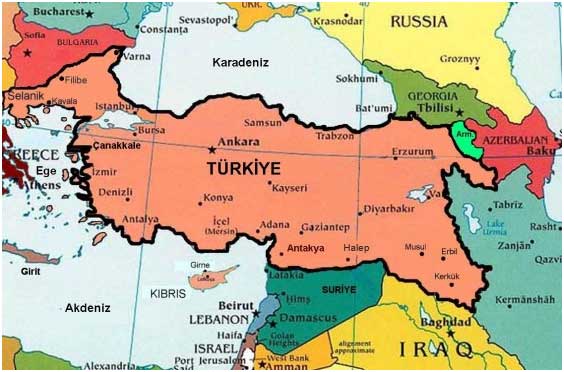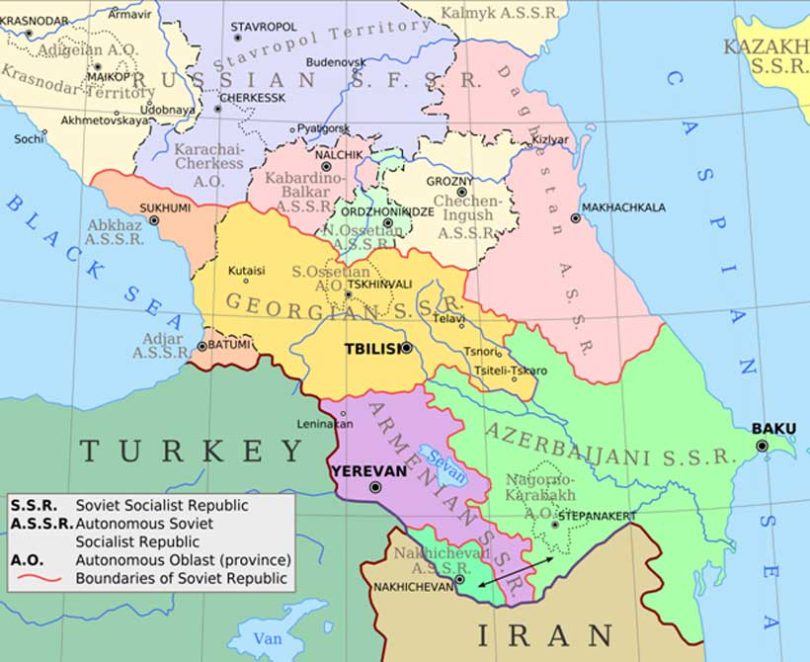The Treaty of Kars, signed in the fall of 1921, established the borders between the Soviet Union and what was to become the Republic of Turkey, as well as clarifying the status of the orphan region of Nakhichevan with its mixed Armenian and Azerbaijani demographics. The Treaty of Kars also recognized the autonomous status of the region Adjaria with its Black Sea port of Batumi. The former region was placed under Soviet Azerbaijani patronage, the latter under Soviet Georgian suzerainty. The Treaty of Kars was a reiteration of the Treaty of Moscow, signed earlier in the same year between the Russian Soviet Federation Socialist Republic and the National Turkish Government (also known as the Turkish National Pact) except its the signatories included of Soviet governments of Azerbaijan, Armenian, and Georgia.
As with most treaties, the political wording may allow unusually broad interpretation, whereas border demarcations are nearly exact. Take for example Article 2 of the Treaty of Kars. It states:
Article 2
The parties to the present agreement undertake not to recognize any peace treaty or other international pact to which any one of such parties may have been compelled by force to be a signatory.
Following on the above, the Governments of the Socialist Soviet Republics of Azerbaijan, Armenia and Georgia agree not to acknowledge any international Acts, regarding Turkey and which has not been acknowledged by the National Turkish Government, as represented by the Grand National Assembly.
In the purposes of the present agreement the term Turkey shall be held to comprise the territories included in the Turkish National Pact and Covenant of the 28th January, 1920 (1336), as drawn up and proclaimed in the Turkish Parliament in Constantinople, and subsequently communicated to the Governments of all the countries and the press.
The Government of the Grand National Assembly of Turkey, on the other hand, undertakes not to acknowledge any international Acts regarding Azerbaijan, Armenia and Georgia, which have not have not been actually acknowledged by the respective Soviet Governments of these States.
Article 2, paragraphs 2 and 4, state that neither Turkey on one side, and Armenia, Georgia, or Azerbaijan on the other will support “international Acts” deemed not in the interest of the other signatory states. Such support includes the territory which comprises Article 5 and Appendix 3 which geographically defines the borders of an autonomous Nakhichevan with Azerbaijan its designated patron. See Administrative map, above. The original Russian word used in Article 2 is покровительством, which translates as patronage.
A technical violation of the Treaty of Kars occurred upon the adoption of the independent constitution of the Republic of Azerbaijan in 1995. Azerbaijan declared itself in Article 7, paragraph 1 of their constitution, a unitary republic, while simultaneously claiming Nakhichevan an autonomous republic as referenced many times in the same document. Azerbaijan cannot simultaneously claim it is a unitary republic while declaring it has autonomous regions. Nakhichevan appears to be an autonomous in name only. Nakhichevan went from an autonomous region to an integrated part the unitary Republic of Azerbaijan, an act not recognized by the Treaty Of Kars.
Interestingly, the term unitary is not found in the Georgian constitution.
The wording in Article 2 does not state that Turkey has particular influence or even a protectorate role in Nakhichevan, a condition often declared in diplomatic circles. Regardless of the semantics, in May of 1992 Russian Marshal Yevgeny Shaposhnikov stated, ”If there is military interference by another party, that will obviously place us on the verge of a third world war, and that cannot be allowed,” when Turkey threatened to intervene on the side of Azerbaijan by placing its troops and arms in Nakhichevan. These Turkish threats came when the tide of the battle over Nagorno-Karabakh had tilted in favor of Armenians at the expense of Azerbaijan. Turkey, a signatory of the Treaty of Kars, would have engaged in an “international Act” against Armenia, violating Article 2, were it not for Shaposhnikov’s response.
The tactical dynamics in 1992 are not the same as those today. However, one must note how fast the Kremlin reacted to 2015 Turkish shooting down of the Russian SU-25 over NW Syria and the Russian recalling the 1945-46 Armenian and Georgian land claims against Turkey and calling for the abrogation the Treaty of Kars. One should also note how fast the Turkish SU-25 attack was forgotten when Turkey and Russia resolved their immediate differences.

Turkish National Pact Map in Violation of the Treaty of Kars
References began appearing about a year ago about a permanent Turkish military presence in Nakhichevan, especially after this past June when Azerbaijan claimed a massive capture of land in Nakhichevan without a shot fired. It turns out Azerbaijan decided to start using relatively barren land on their side of the border, yet made claims of liberating territory from Armenians. One may categorize recent reports about establishing a Turkish military base in Nakhichevan as a nationalist diversion from Turkey’s economic downturn or diplomatic posturing. However, recent Turkish maps (see Turkish National Pact map) make claims over most of the Greek Aegean, parts of Greece proper, parts of Bulgaria, Idlib and Aleppo provinces across northern Syria into Iraqi’s Mosul and Kirkuk provinces. These calls for reinstating what the Turkish National Pact claims belongs to them includes Nakhichevan, Batumi, and more than half of what remains of Armenia. On paper, Turkey is still a NATO member, and the balance of power in the Southern Caucasus would change dramatically for the worse with a base in Azerbaijan.
One should wait and see what transpires in Syria’s Idlib province and the fallout of Turkey’s receipt of Russian S400 missiles before getting too excited about a Turkish base in Nakhichevan.
Also, if Article 2 of the Treaty of Kars is interpreted as written, Turkey cannot support Azerbaijan firing on villages within the Armenian border. This support would be an “international Act” not acknowledged by Armenia. In contrast, Turkey supports Azerbaijan unconditionally against Armenia. Turkey is violating the Treaty of Kars.
Article 6, paragraph 2 of the Treaty of Kars should be of significant concern to Georgia as it allows for unfettered Turkish access to the port of Batumi. This concern is even more critical considering that former Georgian President Saakashvili heavily encouraged Turkish investment specifically in Batumi and Adjaria in general.
Article 6, Paragraph 2
…following conditions:
- Turkey to have the right to free transit of all goods to and from Turkey passing through the port of Batoum free of customs, duties or other taxation, or any form of obstruction, and to have free use of the port of Batoum without the payment of any special dues.
The Turkish and Azerbaijani economic blockade of Armenia is an “international Act” not in the interest of Armenia — a two decades long violation of the Treaty of Kars by half of its signatories. Perhaps treaties, such as Kars, are established to be broken and their tenets ignored.



